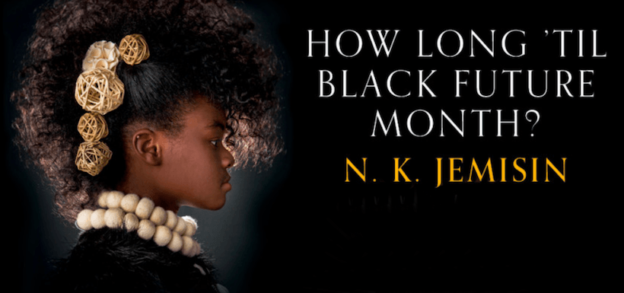Of all our readings from the past two weeks, the Introduction to the Digital Black Atlantic and Making a Case for the Black Digital Humanities really resonated with me, especially because they relate so well to things I’ve been reading and listening to lately. The more I study DH, the more I notice ramifications in the culture around me and the more I find connections between scholarship and articles, books, podcasts, and tv shows.
The Evolution of Digital Blackface

In this article from Wired, Jason Parham reflect on the phenomenon of Digital Blackface on TikTok and its consequences. The problem here is duplicitous: the platform not only fails to sanction racist behaviour, but ended up muting black creators for “hate speech” and aggressive behaviour when they decide to speak up against digital blackface. While reading the Introduction to the Digital Black Atlantic, it was a phrase in particular that made me think about this Wired article:
“There are few contemporary political spaces where the energies of love and imagination are understood and respected as powerful social forces”
Robin D.G. Kelley
In The Evolution of Digital Blackface, Parham reports on Black TikTok creators feeling betrayed by a platform that promised them a place of self-expression and joy.
How long ’til black future month? by N.K. Jemisin.
A few months ago, I was listening to an episode of “LeVar Burton Reads” about Valedictorian, a short story from N.K. Jemisin.

The narrative really captivated me and, as soon as libraries reopened, I borrowed the short story collection How long ’til black future month?. When Kelly Baker Josephs and Roopika Risam talk about Afrofuturism, this book was the first one I thought about. As a fan of science fiction, reading Jemisin’s short stories was eye-opening. When reading the short story collection The Future is Female! I already noticed that sci-fi written by women has very different themes than male-written sci-fi, which is often focused on conquest, colonization, and war. In How long ’til black future month?, the exploration becomes even deeper, entering the realm of race, class, and social justice.
Technology and Race with Ruha Benjamin
This episode of Factually! With Adam Conover from last week ties in with many of the themes we’ve been discussing in DH. Scholar Ruha Benjamin explains how technology is not transparent, but reflects the society it’s produced in…and reproduces the mechanisms of oppression of said society. She coined the term “New Jim Code” to express how technology reproduces the racist assumptions of our society, harming people of color in the process. I recommend listening to this episode, it’s really interesting!
If you have more suggestions about books, articles, movies, tv shows, or podcasts that talk about the instersection of technology and race, please comment below. I would really appreciate some suggestions!





If you’re looking for more reading on technology and race, Wendy Chun’s article “Race and/as Technology” is pretty foundational! Ruha Benjamin’s (who you mentioned) books _Race After Technology_ and _Captivating Technology_ are great as well; I also recommend looking into the work of Safiya Noble and Lisa Nakamura.
For other readings, I have an Are.na channel that I update frequently with readings I come across on this topic—feel free to check it out if you’re interested: https://www.are.na/kevin-pham/race-digitality-technology
Thank you @kevintpme! I happened to read some of Safiya Noble’s work for my Ed Tech class last semester. Looking forward to reading your suggestions 🙂
Thank you for sharing your Are.na channel @kevintpme!
In terms of other readings (I have not yet read the book but came across it while researching for a paper): “Black Software: The Internet & Racial Justice, from the AfroNet to Black Lives Matter” by Charlton McIlwain. I found the Data&Society podcast episode with him where he talks about the book: https://listen.datasociety.net/episodes/black-software
Thanks for sharing the episode of Factually! with Ruha Benjamin!
While reading your piece I couldn’t help but think about this segment from VICE: How Black Panther is Bringing AfroFuturism into the mainstream.
https://youtu.be/-CJ01Pq9Vcw
And this one by DemocracyNow!
https://youtu.be/PXVkbGtewJQ
Thank you @mags31 for the suggestions! Needless to say, I loved Black Panther and the recent death of Chadwick Boseman made me think a lot about the impact of this movie on young generations. For example, in 2018 I went to an event at Marcus Garvey Park in Harlem called “Wakanda Day”(or something very similar), where they had a Wakanda fashion show, a screening of Black Panther, and workshops for kids about VR and technology in general.
Have you seen the Netflix episode of “Abstract: The Art of Design” with Ruth Carter, the costume designer for the Black Panther? It’s epic!
It’s on my list. Thanks for the reminder.
I recommend the work of André Brock, whose new book, Distributed Blackness: African American Cybercultures, I think you’d find really interesting & relevant. Here a a couple of links to recent interviews/talks with him. I also heard a webinar conference with him today where he was summarizing his approach of Critical Technocultural Discourse Analysis: I’ll post the recording to the group when it’s up.
https://youtu.be/-6lbAZ8mxfE
https://youtu.be/syBKg_cw60E
I’m looking forward to digging into all of these suggestions and have one more to toss out: the episode ‘Coding’ in the Netflix series ‘Explained’. It touches on the lack of female and minority representation in the tech industry, and reveals how AI systems and software are bias at their creation. I rewatched it after this week’s readings.